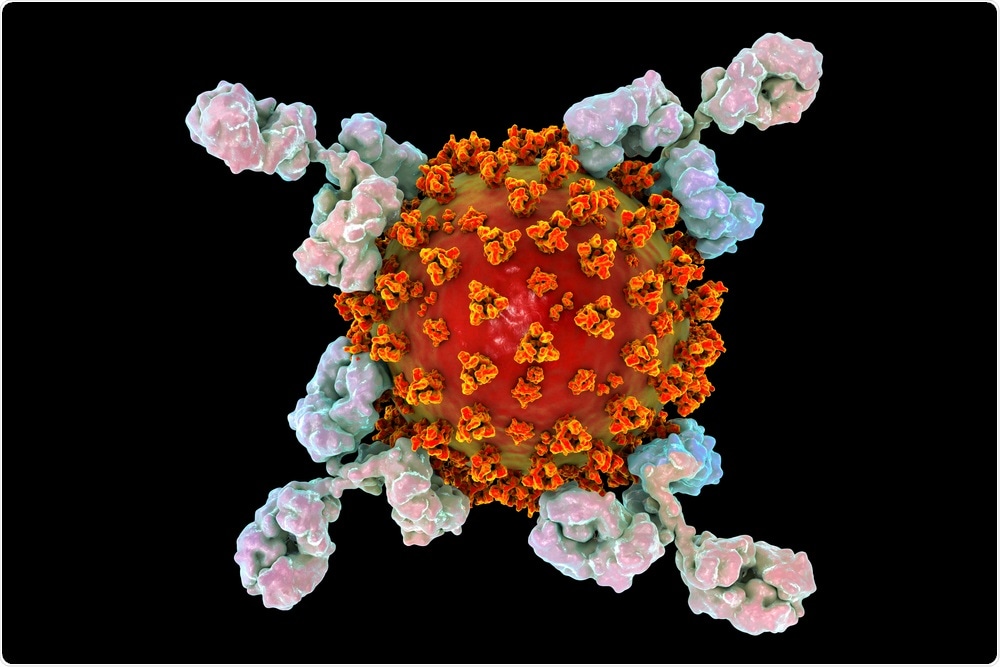Health officials in the United Kingdom urge male coronavirus survivors to donate blood, particularly its convalescent plasma component. This comes after a new study has found that men produce more antibodies, which could make their plasma a valuable treatment against the coronavirus disease (COVID-19).

Antibodies attacking SARS-CoV-2 virus. Image Credit: Kateryna Kon / Shutterstock
The NHS data comes from an analysis of more than 590 donations made between April 21 and May 14, wherein 75 percent were from men.
The new figures show that about 43 percent of male donors had plasma rich enough in antibodies for it to be included in the trial, compared to 29 percent of women.
"We'd still like to hear from anybody who had coronavirus or the symptoms. More plasma donors are needed. But we'd especially want to hear from men. We test every plasma donation, and men have higher antibody levels, which means we're more likely to be able to use their plasma to save lives," Professor David Roberts, associate director for blood donation at NHSBT, said.
"Initially, your immune system will try and fight off a virus with white blood cells. If you become more ill, your immune system needs to produce more antibodies that neutralize or kill the virus. Our studies, and many others around the world, show that men with COVID-19 are more likely to become seriously ill than women. This makes them better plasma donors once they have recovered," he added.
What is convalescent plasma?
Convalescent plasma is a yellowish liquid that makes up about half of the blood volume. After being infected with a virus, the plasma contains antibodies that are used to help fight infection.
Blood plasma therapy or convalescent therapy, which was first used in 1918 during the Spanish flu pandemic, is a treatment option wherein the antibody-rich plasma of someone who has recovered from a viral infection, in this case, the coronavirus disease, is transfused to a patient who is severely ill. The presence of the antibodies in the plasma may help trigger an immune response against the deadly virus.
Convalescent plasma can only be donated by a person who has had the virus. Health experts recommend that donors be fully recovered from COVID-19, as their bodies have had the time to develop a strong antibody response. Currently, the NHS is collecting plasma no sooner than 28 days after recovery.
T cells
Another recent study revealed that female COVID-19 patients had a higher level of T cell activation than males. T cells work by directly killing host cells, activating other cells in the immune system, producing cytokines, and regulating the immune response to fight off an infection. In this study, published on the preprint server medRxiv*, the researchers also found that males were more prone to severe disease and death tied to the coronavirus disease, compared to females. Further, the team found that the median viral RNA titers in the nasopharyngeal swabs were higher in men. Male patients also exhibited elevated levels of inflammatory cytokines and chemokines than female patients.
Test and Trace program
The government in the United Kingdom has launched the national test and trace program, which aims to gather coronavirus survivors to take part in a blood plasma trial. The research aimed to establish whether plasma from those who recovered from the coronavirus can help others to develop their immune response and combat the deadly disease.
"We need people who've recovered from coronavirus (COVID-19) to donate blood plasma, as part of a clinical trial to help with the national effort against the virus," NHS said on its website.
"The trial will tell us how effective convalescent plasma (plasma from people who've had coronavirus) is for treating coronavirus patients," it added.
COVID-19 causes mild to moderate symptoms, but some people are at a high risk of developing severe illness. These include those with underlying health issues, the elderly, and those who are immunocompromised.
People who will be enrolled in the program will receive a text message about 21 days after their result to whether they want to donate their plasma. More than 10,000 people have already enrolled in the trial.
The program also ensures that anyone who develops symptoms of COVID-19 can quickly be tested to see if they harbor the virus and helps trace close contacts of anyone who tests positive for the novel coronavirus.